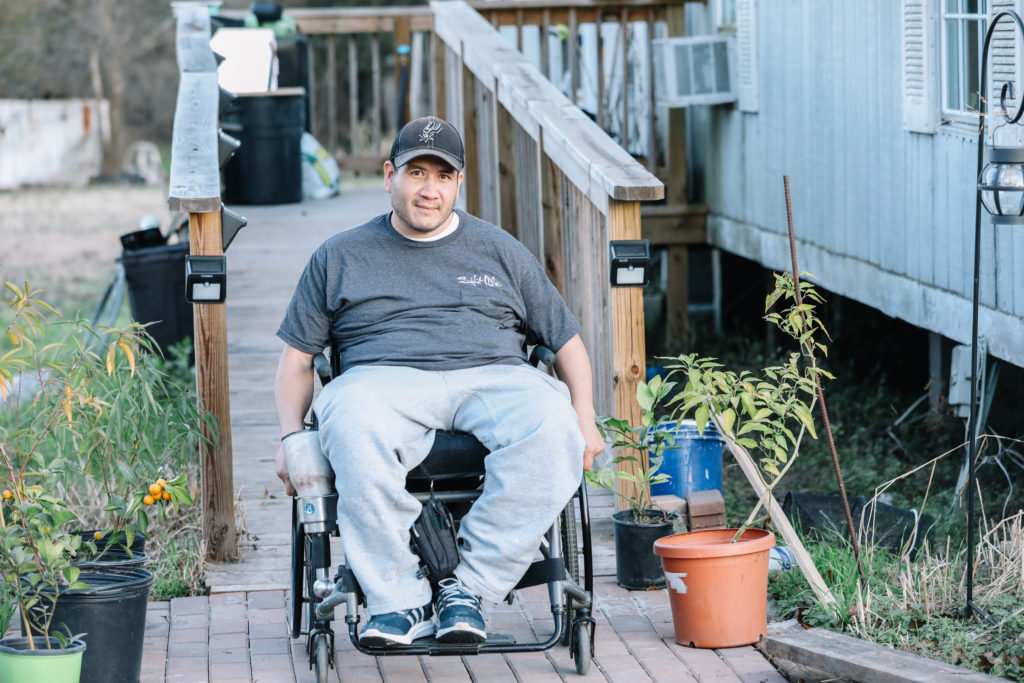Joe Treviño’s life changed overnight when he fell 20 feet from the roof of his home and landed on the metal guardrail of a trampoline. He severed his spinal cord, punctured a lung, and broke his ribs. The accident left him paralyzed from the waist down and emotionally reeling. A carpenter by trade, he didn’t know how he would support his family or even get around.
After an initial week at Brooke Army Medical Center, Joe was transferred to CONNECT + ABILITY at Warm Springs for in-patient rehabilitation care. CONNECT + ABILITY provides support and guidance for those with traumatic brain injuries, spinal cord injuries, amputations, and stroke. They are also advocates, working to eliminate one of the biggest hurdles that people with disabilities are running into: access to transportation as a means to access opportunity.
For Joe, the barrier to access began at home. “I was thinking, you know, how am I even getting into my house? How am I going to get through my entry doors?” CONNECT + ABILITY worked with Joe’s uncle, a carpenter himself, to design and build an entrance ramp.
Joe lives off a private road on the South Side of San Antonio, behind Mission Espada. With the guidance of CONNECT + ABILITY, he recently registered with VIAtrans, which provides service for people with disabilities.
VIA was among the first transit systems in the nation to comply with ADA regulation and today offers multiple services for people with disabilities, including: a taxi subsidy program, complimentary fares for paratransit customers on a fixed-route bus service, and an online service to schedule appointments. The transit agency provides 37 million passenger trips each year. Nonetheless, the need for transportation services outpaces the services available in our community, resulting in a disproportionate effect not only on the lives of people with disabilities, but our fast-growing aging population, as well. In the next decade, the Texas Demographic Center projects that people aged 60-74 will increase by 82% in Bexar County. For 75+, this growth becomes 105%.
VIA President and CEO Jeff Arndt acknowledged that “if there’s a gap, it’s that VIAtrans is offered where VIA is offered.” As VIA routes expand, so too will the VIATrans services. “We know that our transit system is a lifeline for many of our clients to those important functions—like getting to work, getting to school, getting training, getting to dialysis, all those kinds of critical life functions,” Jeff said. “And that’s how we see ourselves. I don’t see VIA as a bus company. I see it as a company that connects people to things that they need so they can have opportunity.”

Joe Treviño, Dawn Dixon and Shelia Brown | Photo by Vanessa Velazquez
Beyond critical life functions, Dawn Dixon, Executive Director of CONNECT + ABILITY sees the effect of transportation barriers on every aspect of their clients’ lives. “So for people with disabilities and older adults who can’t drive, there is zero spontaneity in being able just to go ‘oh, I think I want to go see a movie in two hours,’” said Dawn.
CONNECT + ABILITY, with three full-time and two part-time staff and close to fifty annual volunteers, supports people for up to a year with completely free services. Like most SA2020 Nonprofit Partners, they maximize their impact by working in partnership. CONNECT + ABILITY is one of nearly forty organizations who make-up SALSA, or the Successfully Aging and Living in San Antonio Initiative, hosted by the San Antonio Area Foundation. In this collaborative, CONNECT + ABILITY shows that meeting the transportation needs of San Antonio’s aging population will in turn meet the needs of people with disabilities and ultimately better serve the community-at-large.

